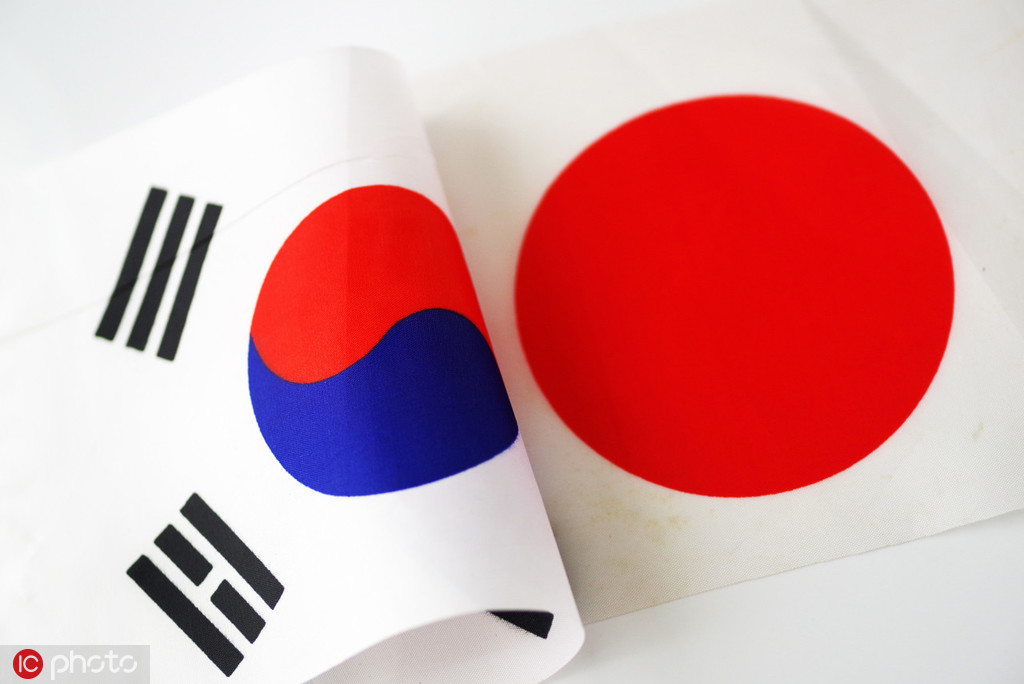News Analysis: ROK keeps military intelligence pact with Japan amid pressure
Xinhua | Updated: 2019-11-23 11:55

SEOUL - South Korea decided unexpectedly on Friday to keep in place a military intelligence-sharing pact with Japan amid rising political pressure both at home and abroad, despite overwhelming public support for its termination.
The General Security of Military Information Agreement (GSOMIA) was originally set to terminate as of midnight Saturday, after Seoul's decision in August to let it expire in response to Japan's tightened regulations in July over its export to South Korea of three materials, vital to producing memory chips and display panels that are the mainstay of the South Korean export.
Just six hours before the scheduled termination, the presidential Blue House of South Korea announced its decision to suspend the GSOMIA termination "under the premise that (South Korea) can end the effectiveness of the GSOMIA at any time."
Kim You-geun, first deputy director of the National Security Office (NSO) of the Blue House, said in a televised press briefing that as long as trade talks between Seoul and Tokyo go on normally, South Korea will suspend its petition with the World Trade Organization (WTO) against Japan's export curbs.
South Korea believed that Japan's export curbs came in protest of the Seoul top court's rulings that ordered some of Japanese firms to pay reparation to the South Korean victims who were forced into hard labor without pay during the 1910-45 colonization of the Korean Peninsula.
In August, Japan dropped South Korea off its whitelist of trusted trading partners that are given preferential export procedure. In response, Seoul removed Tokyo from its whitelist of trusted export partners.
South Korea lodged a complaint with the WTO against Japan on Sept. 11 for the export restrictions. Since then, the two sides held two rounds of talks in Geneva, Switzerland as part of the dispute settlement process under the WTO rules, but those talks ended without progress.
A senior Blue House official told a background briefing to local reporters that the "conditional" halts of the GSOMIA termination and the WTO petition were agreed upon after substantive consultations through diplomatic channels.
The official said the GSOMIA termination and the WTO petition could be cancelled only when all of the trade issues, including the whitelisting and the export curbs, are resolved, saying the final settlement depends on Japan's attitude.
South Korea's position on the GSOMIA seemed to be changed at the last minutes amid the growing pressure from the United States. Kim Hyun-chong, the second NSO deputy director of the Blue House, reported Thursday to South Korean President Moon Jae-in about his visit to Washington earlier this week, according to local media reports.
Local newspaper Hankyoreh reported that Seoul's decision in August to end the three-year-long GSOMIA stoked conflicts between South Korea and the United States, citing repeated U.S. expressions of disappointment and regret over the decision.
The newspaper claimed that Washington sought to institutionalize the trilateral security cooperation with Seoul and Tokyo for its own security interest in the region.
President Moon said in a townhall meeting with 300 civilian panels on Tuesday that the GSOMIA termination was caused by the export restrictions of Japan, which said it cannot trust South Korea for unconfirmed security reasons.
Moon reiterated his position to U.S. Secretary of Defense Mark Esper who paid a courtesy call to the president last Friday, after holding an annual defense meeting with South Korean Defense Minister Jeong Kyeong-doo.
Pressure also came from the political bloc. Hwang Kyo-ahn, chief of the main conservative opposition Liberty Korea Party, went on a hunger strike earlier this week, demanding the renewal of the GSOMIA to safeguard the U.S.-South Korea alliance.
Meanwhile, half of South Koreans supported the GSOMIA expiration. According to the Gallup Korea poll, 51 percent said it was a right decision, while 29 percent was against it. The remaining 20 percent withheld their views.
The result was based on a survey of 1,001 voters conducted from Tuesday to Thursday. It had 3.1 percentage points in margin of error.
In protest against Japan's export restrictions, South Korean consumers have boycotted Japanese products and tour to Japan.
Former conservative South Korean President Lee Myung-bak pushed to ink a hush-hush military accord with Japan in 2012, but it was scrapped at the last minutes amid a public outcry over the closed-door attempt to endorse the GSOMIA.
At the time, a majority of South Koreans opposed the GSOMIA with Japan unrepentant of its colonial-era brutalities.
Former conservative President Park Geun-hye, Lee's successor, hastily signed the GSOMIA in November 2016, less than a month after resuming working-level talks with Japan over the military pact.
The GSOMIA signing came about two weeks before Park's impeachment over a corruption scandal by the parliament in December 2016. The Constitutional Court upheld the parliamentary decision in March 2017, making her the first South Korean leader to be impeached by the National Assembly.
























